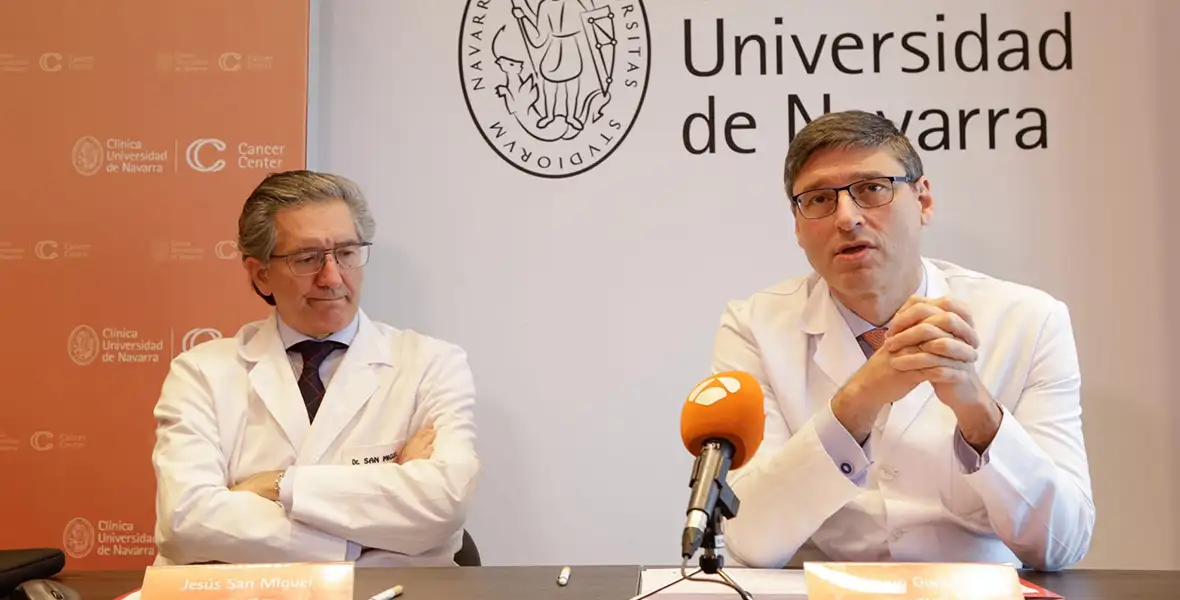The Cancer Center Clínica Universidad de Navarra integrates decades of healthcare, research and teaching experience to treat cancer with greater precision.
Formed by 550 professionals, it includes 14 multidisciplinary clinical areas and has been recognized as a Center of Excellence by the Scientific Foundation of the Spanish Association Against Cancer.

February 2, 2023
A total of 550 medical specialists, researchers, nursing professionals, teachers and other experts make up the Cancer Center Clínica Universidad de Navarra, the oncology center of the Universidad de Navarra, which was presented this afternoon in Madrid.
The new center brings together more than four decades of experience in cancer treatment and research at the University of Navarra, and its mission is to integrate, coordinate and strengthen all the cancer care, research and teaching activities carried out at the Clinic, the Cima and the faculties of the biosanitary area on the Pamplona and Madrid campuses.
The Cancer Center Clínica Universidad de Navarra is a comprehensive cancer center. Its director, Dr. Antonio González, explains that a comprehensive cancer center "stands out not only for its innovative solutions in the prevention, diagnosis and treatment of cancer, but also adds strong links with a university, an outstanding capacity and experience in translational and clinical research, as well as a wide network of international collaboration".
Dr. Antonio Gonzalez points out that "scientific evidence shows that patient outcomes are significantly better in cancer centers". As he recalls, "the European Plan to Combat Cancer has set the development of a network of comprehensive cancer centers in all the countries of the European Union for 2025, so that by 2030 the majority of patients who require it will have access to one of them, thus achieving the most appropriate approach in the fight against oncologic pathologies".
Dr. Jesús San Miguel, Director of Clinical and Translational Medicine at the Universidad de Navarra, stresses that this type of center "must be innovative and generate knowledge", and to this end it is essential that they have "solid multidisciplinary teams that develop cutting-edge research, design and implement clinical trials and apply treatments based on the latest technology and evidence available. These teams are also an ideal environment for the training of clinical specialists and biomedical researchers".
María Iraburu, Chancellor of the Universidad de Navarra, recalled the importance of the Cancer Center as one of the projects of the Universidad de Navarra's Strategy 2025. "Oncology is one of our priority lines of research within the field of personalized medicine, which we understand as the result of offering patients both the best advances in research and humanized medical care, respectful of the unique dignity of each person. In addition, the development of the center requires that multidisciplinary and collaborative approach, with professionals from different areas of knowledge, that a university institution can provide."
Cutting-edge therapies and international certifications
The initial work on the Cancer Center Clínica Universidad de Navarra started in 2017, coinciding with the opening of the hospital's new headquarters in Madrid, although, as Dr. Antonio González recalls, "it brings together the knowledge and experience in cancer of the whole of the Clínica, the Cima and the biomedical faculties of the last decades."
Since 2017, the Cancer Center project has included advances such as the launch of the Advanced Therapies Unit and the most cutting-edge Proton Therapy Unit in Europe. It also has other strengths such as the first certification in Spain of the European Society of Breast Cancer Specialists (EUSOMA), as well as an agreement with the University of Oxford for research and clinical trials in immunotherapy.
The Cancer Center Clínica Universidad de Navarra's 550 medical specialists, researchers, teachers, nursing professionals and other disciplines see more than 3,000 new patients a year. In 2021, 253 research projects were underway and, since that same year, 194 high-impact scientific publications have been produced and there are 404 active clinical trials.
The Cancer Center has 14 multidisciplinary areas and has already been recognized as a "Center of Excellence" by the Scientific Foundation of the Spanish Association Against Cancer, which thus evaluated the relevance and impact of the translational and clinical scientific activity in Oncology of the Universidad de Navarra, the innovative vocation, its international dimension and the good practices in its operation as a center.
A model with more than 50 years in the United States
The first cancer centers were set up in the United States as a result of the National Cancer Act of 1971. Since then, the National Cancer Institute has accredited cancer centers across the country, assessing whether they are indeed creating or improving methods for the prevention, diagnosis and treatment of cancer. Most are part of a university and its hospital. In Europe, cancer centers are grouped together in the OECI (Organization of European Cancer Institutes).
Dr. Jesús San Miguel stresses that the Cancer Center Clínica Universidad de Navarra project "follows a tradition of patient-centered medicine, in which teaching, care and research are naturally integrated". The Director of Clinical and Translational Medicine of the University states the aspiration that the new center "will be one more in that group formed by the best institutions in the United States and Europe, to continue working towards the common objective of curing and curing better".
February 4: World Cancer Day
World Cancer Day will be celebrated next Saturday, February 4, with the aim of raising awareness and mobilizing society to make progress in the prevention and control of this disease. The campaign slogan for 2022 - 2024 is "For fairer care".
It is estimated that approximately one in two men and one in three women will have cancer at some point in their lives. Globally, 9.6 million people die of cancer each year and more than 14 million new cases are diagnosed worldwide.